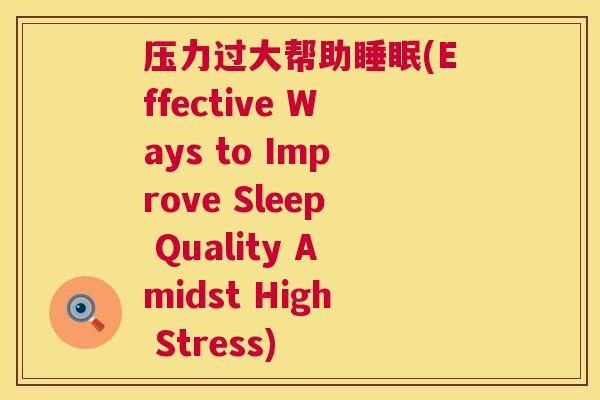压力过大帮助睡眠(Effective Ways to Improve Sleep Quality Amidst High Stress)
Introduction
In today's fast-paced world, many individuals experience high levels of stress, which can significantly impact their ability to get quality sleep. The pressures of work, relationships, and personal responsibilities often contribute to this stress. However, there are effective strategies that can help mitigate the effects of stress on sleep quality. By incorporating these techniques into your routine, you can improve your overall well-being and enjoy a more restful night's sleep.
Understanding the Impact of Stress on Sleep
Before delving into strategies to improve sleep quality amidst high stress, it's essential to understand how stress affects sleep. When you experience stress, your body releases hormones like cortisol, which can disrupt your sleep-wake cycle. Additionally, stress can lead to racing thoughts, making it difficult to relax and fall asleep. Over time, chronic stress can contribute to insomnia and other sleep disorders, further exacerbating the problem.
Establishing a Relaxing Bedtime Routine
One effective way to combat stress-induced sleep problems is by establishing a relaxing bedtime routine. This routine should include activities that help signal to your body that it's time to wind down and prepare for sleep. Consider activities such as reading a book, taking a warm bath, or practicing relaxation techniques like deep breathing or meditation. Avoid stimulating activities like watching TV or using electronic devices, as the blue light emitted from screens can interfere with your body's natural sleep-wake cycle.
Creating a Comfortable Sleep Environment
The environment in which you sleep can also have a significant impact on the quality of your sleep. Creating a comfortable sleep environment can help reduce stress and promote better sleep. Ensure that your bedroom is dark, quiet, and at a comfortable temperature. Invest in a comfortable mattress and pillows that provide adequate support for your body. Additionally, consider using white noise machines or earplugs to block out any disruptive noises that may interfere with your sleep.
Practicing Stress Management Techniques
Implementing stress management techniques into your daily routine can help reduce overall stress levels, making it easier to fall asleep and stay asleep. Techniques such as mindfulness meditation, yoga, and progressive muscle relaxation have been shown to effectively reduce stress and promote relaxation. Find a technique that works for you and incorporate it into your daily routine, especially during times of high stress.
Engaging in Regular Physical Activity
Regular physical activity is not only beneficial for your physical health but also plays a crucial role in managing stress and improving sleep quality. Engaging in aerobic exercise, such as walking, jogging, or swimming, releases endorphins, which are natural stress relievers. Aim for at least 30 minutes of moderate-intensity exercise most days of the week, but avoid vigorous exercise close to bedtime, as it can have a stimulating effect that interferes with sleep.

Seeking Professional Help When Needed
If despite your best efforts, you continue to struggle with stress-induced sleep problems, don't hesitate to seek professional help. A healthcare provider or mental health professional can offer personalized guidance and support tailored to your specific needs. They may recommend therapy, medication, or other interventions to help you manage stress and improve your sleep quality. Remember that seeking help is a sign of strength, and you don't have to face these challenges alone.
Conclusion
Improving sleep quality amidst high stress is essential for maintaining overall health and well-being. By incorporating relaxation techniques, creating a comfortable sleep environment, practicing stress management, engaging in regular physical activity, and seeking professional help when needed, you can effectively mitigate the effects of stress on your sleep. Prioritize self-care and make sleep a priority, as it is crucial for optimal functioning and resilience in the face of life's challenges.






